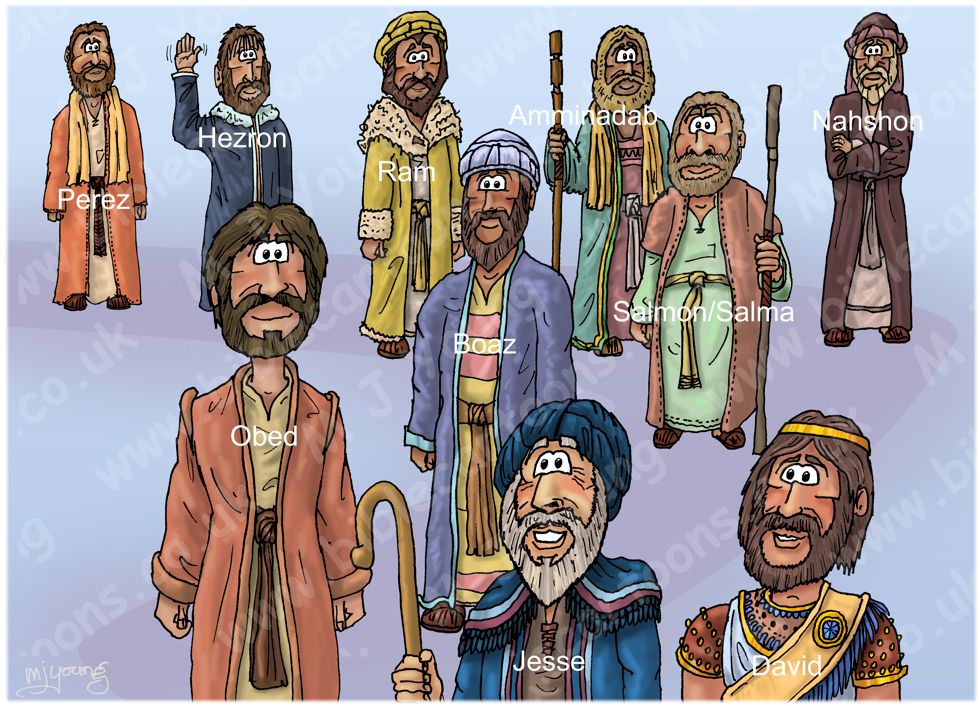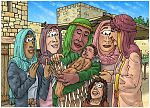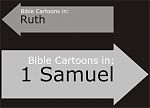Bible Cartoon: Ruth 04 - Genealogy from Perez to David
Click on Add to cart button below shopping cart.
Purchased Bible Cartoons do not have watermarks. Links to Cartoons provided on email once purchase is completed.Bible Book: Ruth
Bible Book Code: 0800401801
Scene no: 1 of 1
Bible Reference & Cartoon Description
Ruth 4:18-22 (NLT)
18 This is the genealogical record of their ancestor Perez:
Perez was the father of Hezron.
19 Hezron was the father of Ram.
Ram was the father of Amminadab.
20 Amminadab was the father of Nahshon.
Nahshon was the father of Salmon. [1]
21 Salmon was the father of Boaz.
Boaz was the father of Obed.
22 Obed was the father of Jesse.
Jesse was the father of David.
[1]
As in Greek manuscripts (see also 4:21); Hebrew reads Salma.
DRAWING NOTES:
TIME OF DAY:
Unspecified in Bible verses above.
LIGHTING NOTES:
Sun above & to the left lights this scene.
CHARACTERS PRESENT:
The 10 men named in the above genealogy: Perez, Hezron, Ram, Amminadab, Nahshon, Salmon/Salma, Boaz, Obed, Jesse, David.
RESEARCH/ADDITIONAL NOTES:
The 10 men named in the above genealogy appear in order, starting from the top left, running in a “Z” shape. From left to right, the first five names/men are Perez, Hezron, Ram, Amminadab, Nahshon. The next three men, Salmon/Salma, Boaz, Obed form the middle of the “Z” shape, running diagonally right to left. Jesse and David (at the bottom of the page), running left to right complete the “Z” shape (see diagram below).
I have made the “Z” pathway quite subtly coloured, below the figures, so as not to detract from them.
“Who’s who?”
Here’s the scene with a name overlay, to help you identity who’s who in this scene.

Ruth 04 – Genealogy from Perez to David – Who’s who?
Below are some notes regarding the 10 men mentioned in the above genealogy. The notes are taken from New Unger’s Bible Dictionary.
Perez, meaning “breach”.
Sometimes spelt Pha´res (fa´rez; Matthew 1:3; Luke 3:33; all KJV) or Pharez, (KJV).
A twin son (with Zarah) of Judah by Tamar (his daughter-in-law; Genesis 38:29; 1 Chron. 2:4). Little is known of his personal history, although his family is often mentioned. He and his brothers were numbered among the sons of Judah (Genesis 46:12), and after the death of Er and Onan he is named as the second son (Numbers 26:20). His family was numerous, as is shown in Ruth 4:12: “May your house be like the house of Perez whom Tamar bore to Judah.” His descendants were notable in the time of David (1 Chron. 27:2-3) and after the captivity (1 Chron. 9:4; Neh. 11:4-6).
Hezron, meaning “enclosure” or “surrounded by a wall”.
The elder of the two sons of Perez and grandson of Judah (Genesis 46:12; Ruth 4:18-19; 1 Chron. 2:5, 9, 18, 21, 24-25; cf. Matthew 1:3; Luke 3:3, where the KJV renders Esrom, and the NASB and NIV, “Hezron”).
Ram, meaning “high” or “exalted”.
The English rendering of two distinct Heb. words. The first, Heb. ram, “high.”
The son of Hezron, a descendant of Perez, of the tribe of Judah, born in Egypt after Jacob’s migration, as his name does not appear in Genesis 46:12. He is mentioned first in Ruth (Ruth 4:19) and appears in the genealogy in 1 Chron. 2:9-10; Matthew 1:3-4; Luke 3:33, after 1875 B.C. In the KJV of Matthew 1:3-4; Luke 3:33, he is called Aram.
Amminadab, meaning “people of liberality” or “my people (or my kinsmen) is generous or noble”.
Son of Ram (Aram, KJV of Matthew 1:4) and father of Nahshon (Naason, KJV of Luke 3:32) who was head of the tribe of Judah at the first numbering of Israel in the second year of the Exodus (Numbers 1:7; Numbers 2:3), about 1440 B.C. He was the fourth in descent from Judah, the sixth in ascent from David (Ruth 4:19-20; 1 Chron. 2:10), and one of the ancestors of Jesus Christ (Matthew 1:4; Luke 3:33; KJV renders Aminadab). He is probably the same Amminadab whose daughter Elisheba was married to Aaron (Exodus 6:23).
Nahshon/Naashon/Naasson, meaning “enchanter” or “sorcerer”.
The son of Amminadab and leader of Judah when first numbered in the desert (Exodus 6:23, Naashon, KJV; Numbers 1:7; 1 Chron. 2:10-11), 1439 B.C. His sister Elisheba was wife to Aaron (Exodus 6:23), and his son Salmon married Rahab after the taking of Jericho (Matthew 1:4-5, “Naashon,” KJV). In the encampment (Numbers 2:3), in the offering of the princes (Numbers 7:12, 17), and in the order of the march (Numbers 10-14), the first place is assigned to him as captain of Judah’s host. We have no further particulars of his life, but we know that he died in the wilderness (Numbers 26:64-65). His name occurs in Matthew 1:4; Luke 3:32 (in both references, Naasson, KJV), in the genealogy of Christ, where his lineage is evidently copied from Ruth 4:18-20; 1 Chron. 2:10-12.
Salmon/Salma, meaning “investiture”.
The son of Nahshon and ancestor of Boaz (Ruth 4:20-21; 1 Chron. 2:11, Salma; Matthew 1:4-5; Luke 3:32), before 1150 B.C. Salma (meaning “clothing” or “garment”), is another form (1 Chron. 2:11) for Salmon. Salmon married Rahab after the taking of Jericho.
Boaz, possibly meaning “quickness”, “fleetness” from Arab. ba‘aza, “to be nimble”; “alacrity”.
A wealthy Bethlehemite, kinsman to Elimelech, the husband of Naomi. When Naomi and Ruth returned from the country of Moab the latter received permission to glean in the fields of Boaz. He treated her generously, offering her much greater privileges than were usually accorded to gleaners. Finding that the kinsman of Ruth, who was more nearly related to her, would not marry her according to the “levirate law,” Boaz voluntarily assumed that law’s obligations. He married Ruth, and their union was blessed by the birth of Obed, the grandfather of David (Ruth 1-4), about 1070 B.C.
Obed, meaning “serving”, “worshipping”.
The son of Boaz and Ruth and father of Jesse the father of David (Ruth 4:17; 1 Chron. 2:12), about 1070 B.C. The name Obed occurs only in Ruth 4:17 and in the four genealogies (Ruth 4:21-22; 1 Chron. 2:12; Matthew 1:5; Luke 3:32).
Jesse, meaning “doubtful”, “wealthy”, “Yahweh exists”, “firm”, or “a gift”.
A son (or descendant) of Obed, the son of Boaz and Ruth (Ruth 4:17, 22; 1 Chron. 2:12; Matthew 1:5-6; Luke 3:32). He had eight sons (1 Samuel 17:12), the youngest of whom was David. Jesse’s wealth consisted chiefly of sheep, for whom David acted as shepherd (1 Samuel 16:11; 1 Samuel 17:34-35). The last historical mention of Jesse is in relation to the asylum that David procured for him from the king of Moab (1 Samuel 22:3-4), before 1000 B.C.
Although Jesse was of prominent lineage, yet he himself was unknown and of modest station in life. In such great messianic passages as Isaiah 11:1, 10, allusion is made to this fact. After Saul had become estranged from David, he contemptuously called him “the son of Jesse,” thereby displaying his scorn toward him (1 Samuel 20:31; 1 Samuel 22:7; 1 Samuel 25:10).
The phrase “stem of Jesse” is used for the family of David (Isa 11:1), and “root of Jesse” for the Messiah (Isa 11:10; Rev 5:5).
David from a root word meaning “to love”, “beloved” or possibly “chieftain”.
David’s name in Heb. means “beloved” or possibly “chieftain,” as evidence from the Mari Letters indicates. Reference in these tablets to the plundering “Benjamites” is indicated by the word dawîdum (“leader”), but the connection between that term and Israel’s most famous king is conjectural. He was born in Bethlehem, the youngest son of a sheikh of that town named Jesse (1 Samuel 16:1). Apparently David had seven older brothers (1 Samuel 16:10)…[There are a lot more notes regarding David in the New Unger’s Bible Dictionary, which I have not included here.]
[Source: New Unger’s Bible Dictionary]





